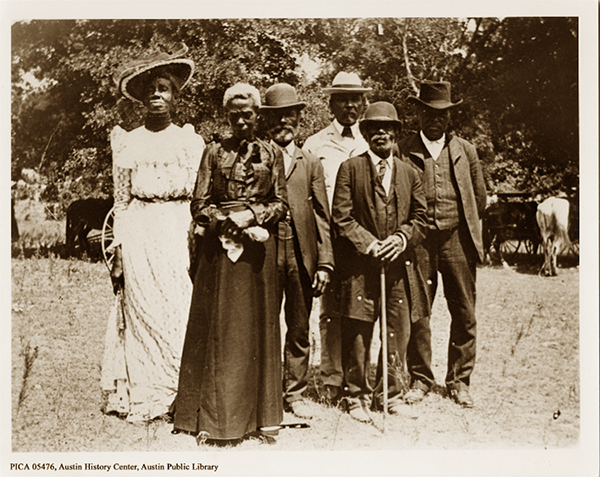In my family, Juneteenth was always a holiday that was juxtaposed with the Fourth of July.
We’d celebrate the latter pretty often. Most years, you could find me in Walmart a few days before the holiday, navigating around shopping carts full of fireworks and moms with armies of children dressed in red, white, and blue. Our own squeaky cart would shriek as we roamed the aisles to hunt down the last box of macaroni.

Picnic at an Emancipation Day celebration, June 19, 1900 held in “East Woods” on East 24th Street in Austin. Credit: Austin History Center.
All the while, in the back of my mind, I would hear the voice of my older aunties, my neighbors, and the random Facebook friend who posted faithfully, every single year: “Y’all doing all this for this so-called Independence Day . . . but did you even celebrate Juneteenth?” Almost always, I’d find a picture of Frederick Douglass as I was scrolling social media. His eyes seemed to look right into my soul. A voice as deep as Morgan Freeman’s would rumble in my head as I read his famous words: “What, to the American slave, is your 4th of July?” I answer, “A day that reveals to him, more than all other days in the year, the gross injustice and cruelty to which he is the constant victim. To him, your celebration is a sham; your boasted liberty, an unholy license; your national greatness, swelling vanity.”
Some in my family might point out that observing the Fourth was less about the actual holiday and more about having the opportunity to get together, share some laughs, and watch some fireworks. Still, I could see the validity of the criticism. How could we celebrate a holiday that was centered around freedom and liberation from an oppressor when not everyone at the time was free?
Part of the complication with celebrating was that, when I was a kid, the story behind Juneteenth seemed almost like a fairy tale to me. I knew the basic premise. Scraps of information that were given here and there told me that years after the Emancipation Proclamation was issued on Jan. 1, 1863, not all enslaved people knew that they were free. Some (in Texas specifically) weren’t told until June 19, 1865. As a kid who grew up during the information age, I was baffled by this: how could they not know they were free? The adults in my life would remind me that people were cruel enough to deliberately keep that knowledge from them – and continued to enslave them even after they knew they were supposed to be free.
Even with these facts being handed to me in bits and pieces, Juneteenth still didn’t feel solid to me. From what I saw, the date wasn’t really treated as real or important in the national conversation. I was surprised when I later learned that some states already noted it as a holiday. No teachers had drilled me about the who and what. There were no “Schoolhouse Rock” episodes. There weren’t even mattress sales. There were simply people who, in passing, took the time to remind me: don’t forget, don’t forget, don’t forget.
Which is why, when I first heard that Juneteenth was going to become a federal holiday, I was shocked. This holiday that had been fed to me bit by bit throughout the years suddenly had a spotlight on it. As an adult who now worked in academia, it was both heartening and overwhelming. I watched people close to me cheer about it, but I also watched a parade of think pieces and statements come out. People all over the internet examined, deconstructed, and reconstructed the holiday: Why now? What does it say about America’s reception of the Black Lives Matter movement? How do we celebrate? Who gets to celebrate? Some people scrambled to learn what it even was.
I myself am still learning and establishing new traditions. Last year, my mom offered to make us some red drinks and invited people to bring food. I may take her up on that this time. I’ll also be attending my first-ever Juneteenth celebration this year. The Atlanta History Center is hosting a huge, multi-part event that will focus on Black genealogy, agriculture, and food. In my role as chair of Georgia Library Association’s Black Caucus, I’ve invited people to come out with me and my fellow officers to learn more about the holiday. I look forward to hearing about their own experiences with Juneteenth and officially growing into this holiday together.
—by Sarah Rodgers, law librarian for outreach and programming, MacMillan Law Library at Emory University
